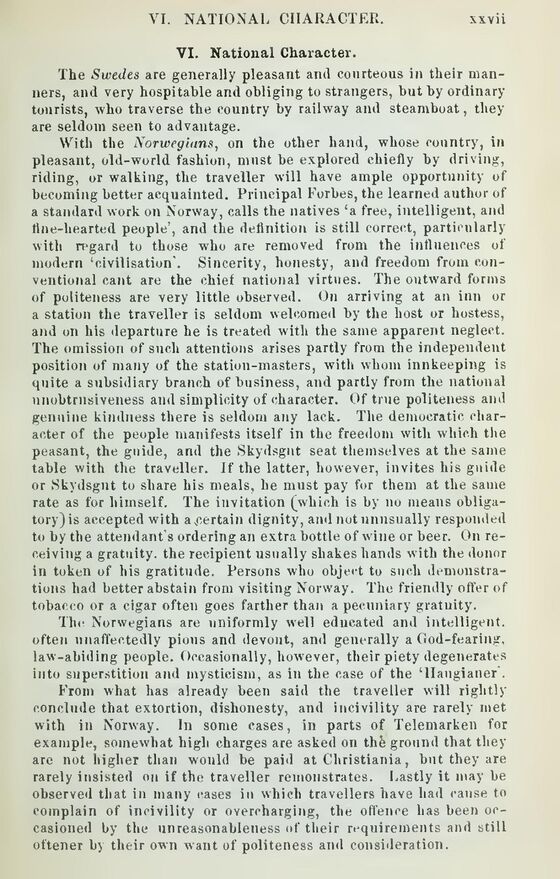
Full resolution (JPEG)
- On this page / på denna sida
- Introduction
- Pages ...

<< prev. page << föreg. sida << >> nästa sida >> next page >>
Below is the raw OCR text
from the above scanned image.
Do you see an error? Proofread the page now!
Här nedan syns maskintolkade texten från faksimilbilden ovan.
Ser du något fel? Korrekturläs sidan nu!
This page has been proofread at least once.
(diff)
(history)
Denna sida har korrekturlästs minst en gång.
(skillnad)
(historik)
VI. National Character.
The Swedes are generally pleasant and courteous in their
manners, and very hospitable and obliging to strangers, but by ordinary
tourists, who traverse the country by railway and steamboat, they
are seldom seen to advantage.
With the Norwegians, on the other hand, whose country, in
pleasant, old-world fashion, must be explored chiefly by driving,
riding, or walking, the traveller will have ample opportunity of
becoming better acquainted. Principal Forbes, the learned author of
a standard work on Norway, calls the natives ‘a free, intelligent, and
flue-hearted people’, and the definition is still correct, particularly
with regard to those who are removed from the influences of
modern ‘civilisation’. Sincerity, honesty, and freedom from
conventional cant are the chief national virtues. The outward forms
of politeness are very little observed. On arriving at an inn or
a station the traveller is seldom welcomed by the host or hostess,
and on his departure he is treated with the same apparent neglect.
The omission of such attentions arises partly from the independent
position of many of the station-masters, with whom innkeeping is
quite a subsidiary branch of business, and partly from the national
nnobtrnsiveness and simplicity of character. Of true politeness and
genuine kindness there is seldom any lack. The democratic
character of the people manifests itself in the freedom with which the
peasant, the guide, and the Skydsgnt seat themselves at the same
table with the traveller. If the latter, however, invites his guide
or Skydsgnt to share his meals, he must pay for them at the same
rate as for himself. The invitation (which is by no means
obligatory) is accepted with ascertain dignity, and not unusually responded
to by the attendant’s ordering an extra bottle of wine or beer. On
receiving a gratuity, the recipient usually shakes hands with the donor
in token of his gratitude. Persons who object to such
demonstrations had better abstain from visiting Norway. The friendly offer of
tobacco or a cigar often goes farther than a pecuniary gratuity.
The Norwegians are uniformly well educated and intelligent,
often unaffectedly pious and devout, and generally a God-fearing,
law-abiding people. Occasionally, howTever, their piety degenerates
into superstition and mysticism, as in the case of the ‘Haugianer’.
From what has already been said the traveller will rightly
conclude that extortion, dishonesty, and incivility are rarely met
with in Norway. In some cases, in parts of Telemarken for
example, somewhat high charges are asked on thk ground that they
are not higher than would be paid at Christiania, but they are
rarely insisted on if the traveller remonstrates. Lastly it may be
observed that in many cases in which travellers have had cause to
complain of incivility or overcharging, the offence has been
occasioned by the unreasonableness of their requirements and still
oftener by their own want of politeness and consideration.
<< prev. page << föreg. sida << >> nästa sida >> next page >>
Project Runeberg, Sat Dec 9 14:19:04 2023
(aronsson)
(diff)
(history)
(download)
<< Previous
Next >>
https://runeberg.org/baenosw89/0035.html



